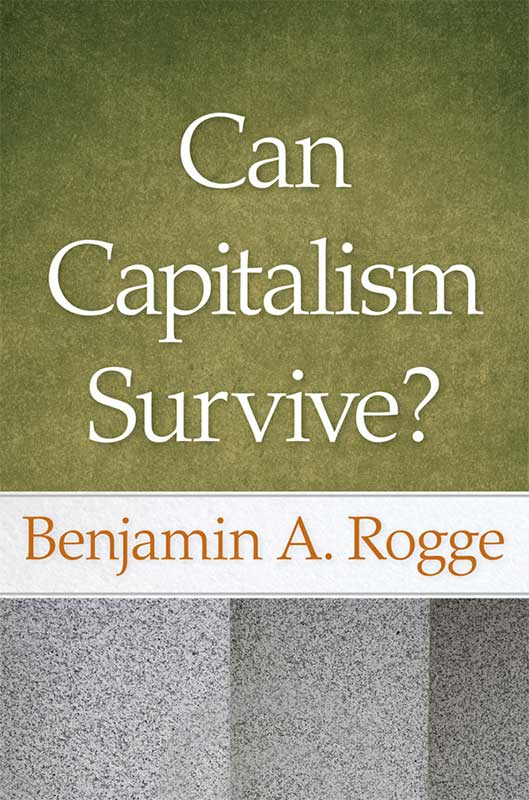Can Capitalism Survive?
By Benjamin A. Rogge
One of the signs of advancing age in the American college professor is a tendency for him to write less and publish more. This seeming paradox is easily explained by the phenomenon of
Collected Works, that is, by what on television would be described as reruns. As in television, no great public outcry is needed to bring forth the reruns; a question from his wife, a polite suggestion from a colleague, and the cut-and-paste operation is under way.I have put together here what I believe to be the best of the rather meager output of my professional career up to this point. For reasons (mostly financial) that always seemed adequate at the moment, I have been more of a speechmaker than a writer. Thus, you will find that many of the pieces in this collection are but speeches put down on paper…. [From the Foreword]
First Pub. Date
1979
Publisher
Indianapolis, IN: Liberty Fund, Inc. Liberty Fund, Inc.
Pub. Date
1979
Comments
Collected essays.
Copyright
The text of this edition is under copyright. Picture of Benjamin Rogge: file photo, courtesy of Liberty Fund, Inc.
- Foreword
- Part I, Introduction
- Part I, Chapter 1, Can Capitalism Survive
- Part II, Introduction
- Part II, Chapter 1, The Case for Economic Freedom
- Part II, Chapter 2, The Libertarian Philosophy
- Part II, Chapter 3, Who is to Blame
- Part II, Chapter 4, Paradise in Posey County
- Part III, Introduction
- Part III, Chapter 1, Adam Smith, 1776-1976
- Part III, Chapter 2, Christian Economics: Myth or Reality
- Part III, Chapter 3, College Economics: Is It Subversive of Capitalism
- Part IV, Introduction
- Part IV, Chapter 1, Profits
- Part IV, Chapter 2, The Businessman
- Part V, Introduction
- Part V, Chapter 1, The Labor Monopoly
- Part VI, Introduction
- Part VI, Chapter 1, The Long-Run Economic Outlook
- Part VI, Chapter 2, Alleged Causes of Inflation, Corporate Monopolies
- Part VII, Introduction
- Part VII, Chapter 1, The Problems of Cities
- Part VIII, Introduction
- Part VIII, Chapter 1, Financing Higher Education in the United States
- Part VIII, Chapter 2, The Promise of the College
- Part IX, Introduction
- Part IX, Chapter 1, The Businessman and the Defense of Capitalism
- Part IX, Chapter 2, Reflections on the Election of 1964
- Part IX, Chapter 3, The Foundation for Economic Education, Success or Failure
Part IX, Introduction
Part IX
ON WHAT TO DO
If you have stuck with me up to this point, you may be weary of one paragraph of despair after another, of one diagnosis after another of the ailments of present-day capitalism. If you share, in whole or in part, my conviction that capitalism is the only economic system consistent with the civilized life, you are probably anxious to move on from diagnosis to therapy. “What can I, as one person or as part of an organization, do about it? What would you have us do?”
As I say in the first paper of this section, “Frankly, I feel more at ease as the diagnostician than as the therapist.” At the same time, I have discussed the question of what to do on various occasions, and three such discussion papers are presented here. The first paper was presented as an explicit follow-up to the Schumpeter-based “Can Capitalism Survive?” Various groups who were exposed to Schumpeter’s analysis of things to come insisted that I come back with a message on how to keep those things from coming to pass. In Marxian language, in this paper I am trying to tell the bourgeoisie how to avoid being expropriated.
The second paper was written approximately a month before the presidential election of 1964. It is now clear that, at that time, I overestimated the damage that would be done to the conservative cause by a crushing defeat of Goldwater. At the same time, the course of events seems to me to have left my general conclusions on what to do largely untouched.
The final paper was given as a tribute to one man and the organization he created—to Leonard Read and the Foundation for Economic Education. It is with pleasure that I make public payment of my great debt to this man, but the paper is presented here because in writing it I found some ways of saying certain things on the practice of freedom that I have not been able to improve upon elsewhere.
The Wealth of Nations (New York: Modern Library, 1937), p. 423.
The General Theory of Employment, Interest, and Money (New York: Harcourt Brace, 1936), p. 383.
Human Action (Chicago: Henry Regnery Co., 1963), p. 864.
Capitalism, Socialism, and Democracy, 3rd ed. (New York: Harper & Row, 1962), pp. 144, 137.
Walden and Other Writings (New York: Modern Library), p. 645.
National Review, August 11, 1964, pp. 683-86.
The General Theory of Employment, Interest and Money (New York: Harcourt, Brace, 1936), p. 383.
The Road to Serfdom (Chicago: University of Chicago Press, 1944), particularly the chapter on “Why the Worst Rise to the Top.”
War and Peace, Inner Sanctum ed., p. 193.
The Public Interest, Fall 1970, p. 74.

